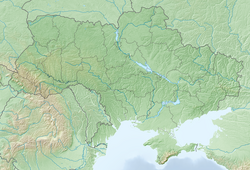| Tsori Gilod Synagogue | |
|---|---|
 The synagogue façade in 2008 | |
| Religion | |
| Affiliation | Orthodox Judaism |
| Ecclesiastical or organisational status |
|
| Ownership | Beis Aharon V’Yisrae community |
| Status | Active |
| Notable artwork | Murals by:
|
| Location | |
| Location | 4 Brativ Mikhnovskykh Street, Lviv, Lviv Oblast 79018 |
| Country | Ukraine |
Location of the synagogue in Ukraine | |
| Geographic coordinates | 49°50′17″N24°00′16″E / 49.83806°N 24.00444°E |
| Architecture | |
| Architect(s) | Albert Kornblüth |
| Type | Synagogue architecture |
| Style | |
| Completed | 1925 |
| Materials | Brick |
| [1] [2] [3] [4] | |
The Tsori Gilod Synagogue, known in more recent times as Beis Aharon V'Yisrael Synagogue (transliterated from Hebrew as "The House of Aaron and Israel" [5] ), is an Orthodox Jewish synagogue, located at 4 Brativ Mikhnovskykh Street, in Lviv, in the Lviv Oblast of Ukraine.





